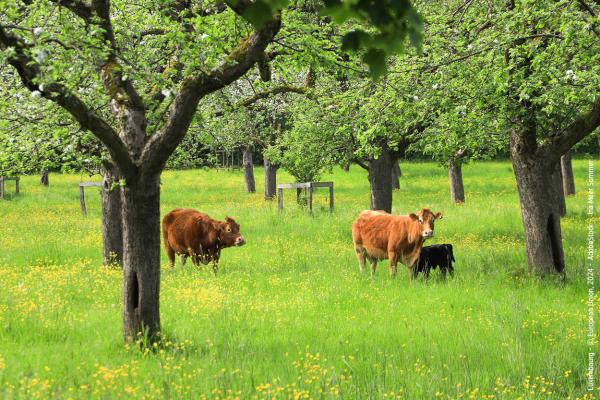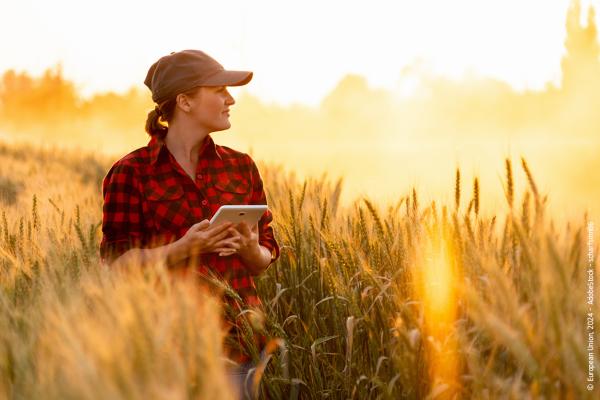
This year’s winners follow the high standards set by their predecessors and showcase sustainable and inspiring projects across the European organic value chain. The winning projects – and the people behind them- demonstrate how organic agriculture and production can create innovative value chains and generate new job opportunities in rural areas.
The winners of the edition 2024 of the EU Organic Awards are:
- Best organic farmer (female) to Ms Reinhilde Frech-Emmelmann in Austria. Ms Frech-Emmelmann founded ReinSaat GmbH in 1998 at a biodynamic Demeter farm in St. Leonhard am Hornerwald, Lower Austria. The farm specialises in organic, GMO-free seeds, with over 800 seed-resistant varieties, promoting biodiversity and sustainable farming across Europe.
- Best organic farmer (male) to Mr Benny Schöpf in Germany. Mr Schöpf is the chief vegetable grower at Kartoffelkombinat, the largest community-supported cooperative farm in Germany. Supplying 2,300 households with organic vegetables weekly, the farm prioritises fair working conditions and sustainable practices, promoting an alternative agricultural economic system.
- Best organic region to South Savo in Finland. South Savo has built a strong organic farming culture through 40 years of collaboration between farmers, researchers, and local authorities. With 200 organic farms, the region promotes sustainable practices, preserving water quality and biodiversity, and is home to the Finnish Organic Research Institute.
- Best organic city to BioStadt Bremen in Germany. With over 30% of farms certified organic, the city promotes sustainable food systems through community projects and innovative farming initiatives, empowering citizens to drive local change. BioStadt Bremen is working towards converting all municipal catering in schools, crèches, and hospitals to 100% organic by 2025.
- Best organic bio-district to Sörmland Bio-district in Sweden. Located south of Stockholm, Sörmland has been a pioneer in organic farming since the 1940s, bringing together farms, food processors, restaurants, and more. With 20% of its farmland organic, the district promotes local organic products, sustainable tourism, and awareness of organic food’s health benefits.
- Best organic food processing SME to Gino Girolomoni Cooperativa Agricola in Italy. Located in the Marche region, this cooperative specialises in organic pasta production, continuing the mission of its founder, Gino Girolomoni. With 80 hectares of organic farmland and renewable energy-powered facilities, it produces 9 million tons of pasta annually, supporting over 300 farmers and 60 local workers.
- Best organic food retailer to SAiFRESC in Spain. Founded by three farmers in 2011, SAiFRESC transitioned to organic farming, revitalising agriculture in the Huerta de Valencia. With 30 hectares of organic land, they produce 70 organic products, selling 90% of their harvest locally and reducing packaging. The initiative promotes a circular economy and provides educational workshops on organic farming.
- Best organic restaurant/food service to a Kalf & Hansen in Sweden. Founded in 2014 by Rune and Fabian Kalf-Hansen, this restaurant chain offers 100% organic, seasonal Nordic cuisine. With two restaurants, catering services, and organic meals on Swedish trains, Kalf & Hansen prioritise local sourcing, sustainability, and affordable organic meals, building strong relationships with local producers.
Nearly 100 applications were received from across the EU for this year's edition, with 24 candidates shortlisted from 11 countries. The EU Organic Awards feature 7 categories and 8 individual awards, recognising innovative, sustainable, and inspiring projects that add significant value to organic production and consumption. The awards are organised by the European Commission, the European Economic and Social Committee, the European Committee of the Regions, COPA-COGECA, and IFOAM Organics Europe, with support from the European Parliament and the Council.
Background
EU Organic Day was launched by the European Parliament, Council, and European Commission in 2021 as a new initiative to celebrate and promote organic farming.
By producing high quality food with low environmental impact, organic farming plays an essential role in developing a sustainable food system for the EU. Following the EU Action Plan for the Development of Organic Production in the EU, adopted in 2021, the Commission works to further promote the benefits of organic production. The launch and celebration of an EU Organic Day and EU Organic Awards are two concrete actions to bring organic farming into the spotlight. The CAP Strategic Plans in the current Common Agricultural Policy also provides more financial support – €14.7 billion from 2023 to 2027 – for EU farmers converting to and remaining in organic farming. Nearly all Member States now have comprehensive organic production strategies in place, for the first time ever.
Between 2012 and 2022, the share of total organic area in the EU's total utilised agricultural area rose from 5.9 % to an estimated 10.5 %. This represents an estimated increase of 7.4 million hectares. In the last few years, the market for organic products has held up remarkably despite certain challenges, notably the high food inflation and rise of energy costs. Total EU organic retail sales increased from €38.6 billion in 2019 to €45.0 billion in 2022, with a peak at €46.3 billion in 2021.The EU is the second largest market for organic products, after the US.
More examples of the actions taken under the EU action plan to develop organic production are available in this factsheet (PDF).
Quotes
Commissioner for agriculture, Janusz Wojciechowski:
Today, we celebrate organic farming and the EU organic sector as a whole. This sector is very close to my heart, as it represents everything that I think is important in our food system: progressing towards more sustainable methods and practices; increasing resilience against climate change and supply chain disruptions; providing opportunities for small farmers, young farmers, female farmers; and connecting local communities through short supply chains and bio-districts. I wholeheartedly congratulate today’s winners – they provide living proof of a strong and sustainable organic sector in the EU.
Mr. Oliver Röpke, President of the European Economic and Social Committee of the European Economic and Social Committee:
The Organic Awards serve to reward excellent and innovative organic businesses in the EU, and getting inspired by their work and achievements. The organic sector deserves recognition and promotion throughout the food chain. Accessibility and affordability of organic food is very important for the sector to grow, and in turn, also helps the EU to reach the 25% target by 2030. I am proud that the EESC is a partner in managing three of these awards, connecting with the whole EU organic community.
Ms. Kirstine Bille, Representative of the European Committee of the Regions in the organic awards jury:
As the CAP is the main tool to support the development of organic farming, its budget for greening should be supplemented by additional resources to support adequately the farmers in the transition to sustainable farming. Moreover, we call for a stronger role for the regions in managing the future CAP so as to bring policy options in line with specific territorial and sectoral characteristics.
Mr. Mladen Jakopovic, COPA Vice President:
The EU Organic Awards spotlight the diversity, resilience and excellence of organic farming in Europe. They present inspiring stories of vision and perseverance, demonstrating what is possible when sustainability and innovation go hand in hand. As Copa and Cogeca, we are proud to be partners for this third edition. I would like to thank all participants and commend all the winners for their dedication and contribution to European organic farming.
Mr. Jan Plagge, IFOAM Organics Europe's President:
The EU Organic Awards showcase the organic supply chain’s role in the transition towards sustainable farming systems that stay within planetary boundaries and reconcile environmental sustainability with a fair income for farmers – a common European goal identified through the Strategic Dialogue. On behalf of IFOAM Organics Europe, I congratulate this year's winners for showcasing organic’s transformative potential through their outstanding initiatives. Their achievements spotlight organic’s growing significance as the only regulated sustainable production system that already delivers environmental and climate protection, all while fostering environmental, economic and social sustainability. Congratulations also to all those who put themselves in the game! May their endeavours inspire many more to become part of this food and farming revolution towards a more resilient, sustainable and competitive future.
Details
- Publication date
- 23 September 2024
- Author
- Directorate-General for Agriculture and Rural Development
- Location
- Brussels




